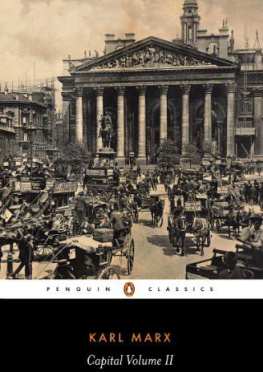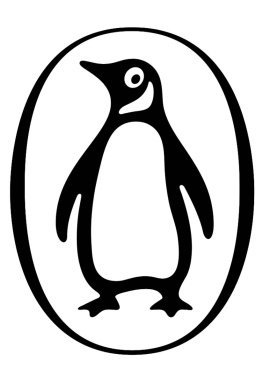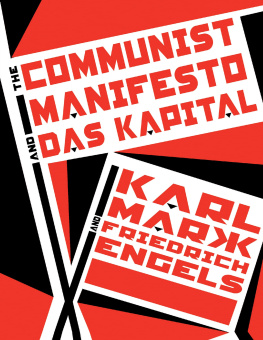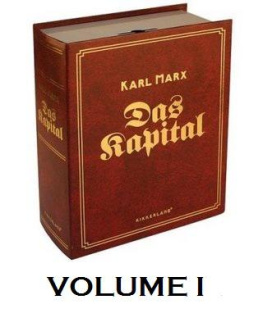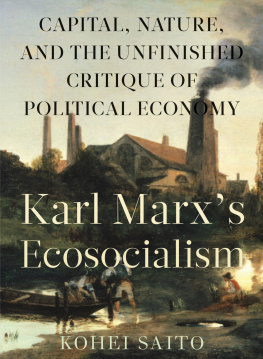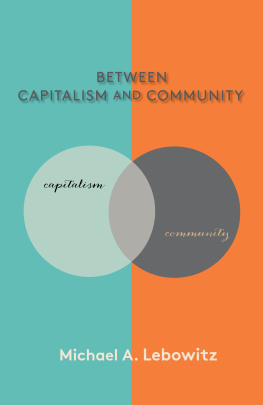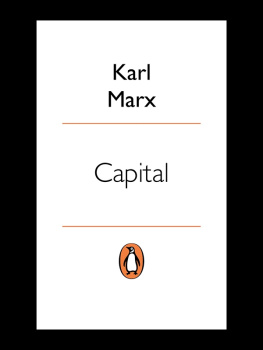Karl Marx
CAPITAL
A Critique of Political Economy
Volume One
Introduced by Ernest Mandel
Translated by Ben Fowkes
Penguin Books in association with New Left Review
Contents
III. Capitalist Production is the Production and
Reproduction of the Specifically Capitalist Relations of Production
PENGUIN CLASSICS
CAPITAL
VOLUME 1
Karl Marx was born at Trier in 1818 of a GermanJewish family converted to Christianity. As a student in Bonn and Berlin he was influenced by Hegels dialectic, but he later reacted against idealist philosophy and began to develop his theory of historical materialism. He related the state of society to its economic foundations and mode of production, and recommended armed revolution on the part of the proletariat. In Paris in 1844 Marx met Friedrich Engels, with whom he formed a life-long partnership. Together they prepared the Manifesto of the Communist Party (1848) as a statement of the Communist Leagues policy. In 1848 Marx returned to Germany and took an active part in the unsuccessful democratic revolution. The following year he arrived in England as a refugee and lived in London until his death in 1883. Helped financially by Engels, Marx and his family nevertheless lived in great poverty. After years of research (mostly carried out in the British Museum), he published in 1867 the first volume of his great work, Capital. From 1864 to 1872 Marx played a leading role in the International Working Mens Association, and his last years saw the development of the first mass workers parties founded on avowedly Marxist principles. Besides the two posthumous volumes of Capital compiled by Engels, Karl Marxs other writings include The German Ideology, The Poverty of Philosophy, The 18th Brumaire of Louis Bonaparte, The Civil War in France, A Contribution to the Critique of Political Economy, Grundrisse: Foundations of the Critique of Political Economy and Theories of Surplus-Value.
Ernest Mandel was born in 1923. He was educated at the Free University of Brussels, where he was later Professor for many years, and the cole Pratique des Hautes tudes in Paris. He gained his Ph.D. from the Free University of Berlin. He was a Member of the Economic Studies Commission of FGTB (Belgian TUC) from 1954 to 1963 and was chosen for the annual Alfred Marshall Lectures by Cambridge University in 1978. His many books include The Formation of the Economic Thought of Karl Marx, Late Capitalism, The Long Waves of Capitalist Development, The Second Slump and The Marxist Theory of Bureaucracy. His influential pamphlet, An Introduction to Marxist Economics, sold over half a million copies and was translated into thirty languages. Ernest Mandel died in July 1995. In its obituary the Guardian described him as one of the most creative and independent-minded revolutionary Marxist thinkers of the post-war world.
Introduction
When Volume 1 of Capital was first published, capitalist industry, though predominant in a few Western European countries, still appeared as an isolated island encircled by a sea of independent farmers and handicraftsmen which covered the whole world, including the greater part even of Europe. What Marxs Capital explained, however, was above all the ruthless and irresistible impulse to growth which characterizes production for private profit and the predominant use of profit for capital accumulation. Since Marx wrote, capitalist technology and industry have indeed spread all over the world. As they have done so, moreover, not only have material wealth and the possibilities for freeing mankind definitively from the burden of meaningless, repetitive and mechanical work increased, but so too has the polarization of society between fewer and fewer owners of capital and more and more workers of hand and brain, forced to sell their labour-power to these owners. The concentration of wealth and power in a small number of giant industrial and financial corporations has brought with it an increasingly universal struggle between Capital and Labour.
Periodically the bourgeois class and its ideologues have thought they have found the stone of wisdom; have felt able, accordingly, to announce the end of crises and socio-economic contradictions in the capitalist system. But despite Keynesian techniques, notwithstanding all the various attempts to integrate the working class into late capitalism, for over a decade now the system has appeared if anything more crisis-ridden than when Marx wrote Capital. From the Vietnam war to the turmoil of the world monetary system; from the upsurge of radical workers struggles in Western Europe since 1968 to the rejection of bourgeois values and culture by large numbers of young people throughout the world; from the ecology and energy crises to the recurrent economic recessions: there is no need to look very far for indications that capitalisms heyday is over. Capital explains why the sharpening contradictions of the system were as inevitable as its impetuous growth. In that sense, contrary to a generally accepted belief, Marx is much more an economist of the twentieth century than of the nineteenth. Todays Western world is much nearer to the pure model of Capital than was the world in which it was composed.
1. THE PURPOSE OF CAPITAL
In Capital Marxs fundamental aim was to lay bare the laws of motion which govern the origins, the rise, the development, the decline and the disappearance of a given social form of economic organization: the capitalist mode of production. He was not seeking universal laws of economic organization. Indeed, one of the essential theses of Capital is that no such laws exist. For Marx, there are no economic laws valid for each and every basically different form of society (aside from trivialities like the formula which points out that no society can consume more than it produces without reducing its stock of wealth whether the natural fertility of the land, the total population, the mass of means of production, or several of these). Each specific social form of economic organization has its own specific economic laws. Capital limits itself to examining those which govern the capitalist mode of production.
Capital is therefore not pure economic theory at all. For Marx, pure economic theory, that is economic theory which abstracts from a specific social structure, is impossible. It would be similar to pure anatomy, abstracted from the specific species which is to be examined. We can push the analogy further. Although, of course, comparative anatomy is a branch of natural science, useful for increasing our knowledge of human and animal physiology, it can be only a by-product of the development of the anatomical understanding of specific given species. In the same way, Marxs theory of historical materialism does indeed include comparative economic analysis for example an examination of the evolution of human labour, human labour productivity, social surplus product and economic growth, from slave society through feudalism to capitalism. But such comparison can result only from the analysis of specific modes of production, each with its own economic logic and its own laws of motion. These cannot be superseded by or subsumed under eternal economic laws. We can even push the analogy to its final conclusion. If one tries to find some basic common kernel in all anatomy, one leaves the realm of that specific science and enters another: biology or biochemistry. In the same way, if one tries to discover basic working hypotheses valid for all economic systems, one passes from the realm of economic theory to that of the science of social structures: historical materialism.



